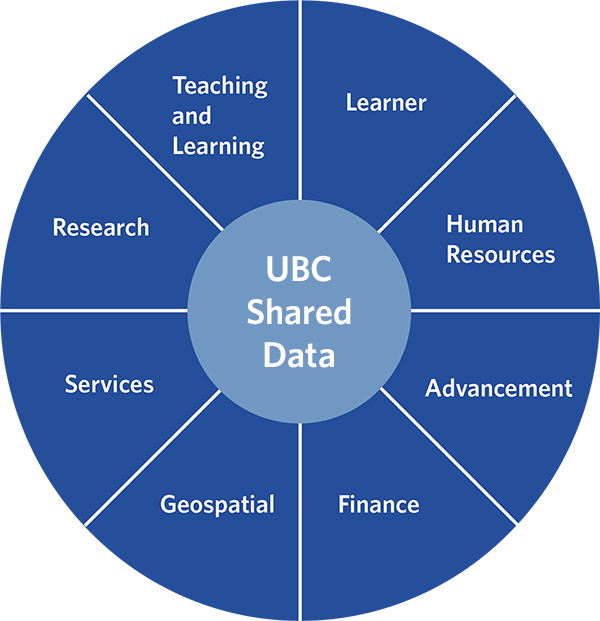Communities of Practice
A Community of Practice (CoP) is a group with shared concerns, problems, or an interest in a topic who come together to fulfill both individual and group goals. Communities of Practice can be a mechanism to facilitate change as well as a knowledge management strategy. Data Governance CoPs are intended to be a network to connect individuals engaged in data management, and reporting across the university, to help drive awareness of the process, tools, and services centrally offered, and to engage in leading practices and governance. The CoP will help build and enable data literacy at the University, increasing the University's ability to execute on data management and self-serve reporting.
Data Communities
Organization of UBC's data landscape into various data communities creates an integrated and collaborative process by allowing all stakeholders with vested interests in a common set of data elements to come together for decision making.
Together, all the data communities represent UBC's various functions and corresponding enterprise data elements that are in scope of Data Governance.

The UBC shared Data community is comprised of institutional stakeholders with interest in business objects which are agreed on and shared across the Institution. UBC shared data includes operational, analytical and reference data. Examples of UBC shared data are all the attributes of a person such as gender, indigenous status, and etc.
Learn about the different data communities:
UBC shared data community is comprised of institutional stakeholders with interest in business objects which are agreed on and shared across the Institution. UBC shared data includes operational, analytical and reference data. Examples of UBC shared data are all the attributes of a person such as gender, indigenous status, and etc.
Advancement data community consists of institutional stakeholders who have an interest in operations pertaining to alumni and donor relationships.
Finance data community is comprised of institutional stakeholders who have an interest in financial operations and planning. Examples include financial planning and mandatory financial reporting requirements.
Geospatial data community is comprised of institutional stakeholders who have an interest in geographical information, such as campuses, buildings, classroom, etc.
Services data community is comprised of institutional stakeholders who have an interest in services information, such as Campus, Emergency, or IT services.
Human Resources data community is comprised of institutional stakeholders who have an interest in UBC's human capital information. For example, all data pertaining to recruitment of prospective staff falls under this community.
Research data community is comprised of institutional stakeholders who have an interest in data created or generated as part of research projects at UBC.
Learner data community is comprised of institutional stakeholders who have an interest in learner information as they progress through the learner lifecycle. For example, all attributes pertaining to a student's academic achievements fall under this data community.
Teaching and Learning data community is comprised of institutional stakeholders who have an interest in measurement, collection, analysis, and reporting of data about learners with the goal of understanding and optimizing the learning environment.